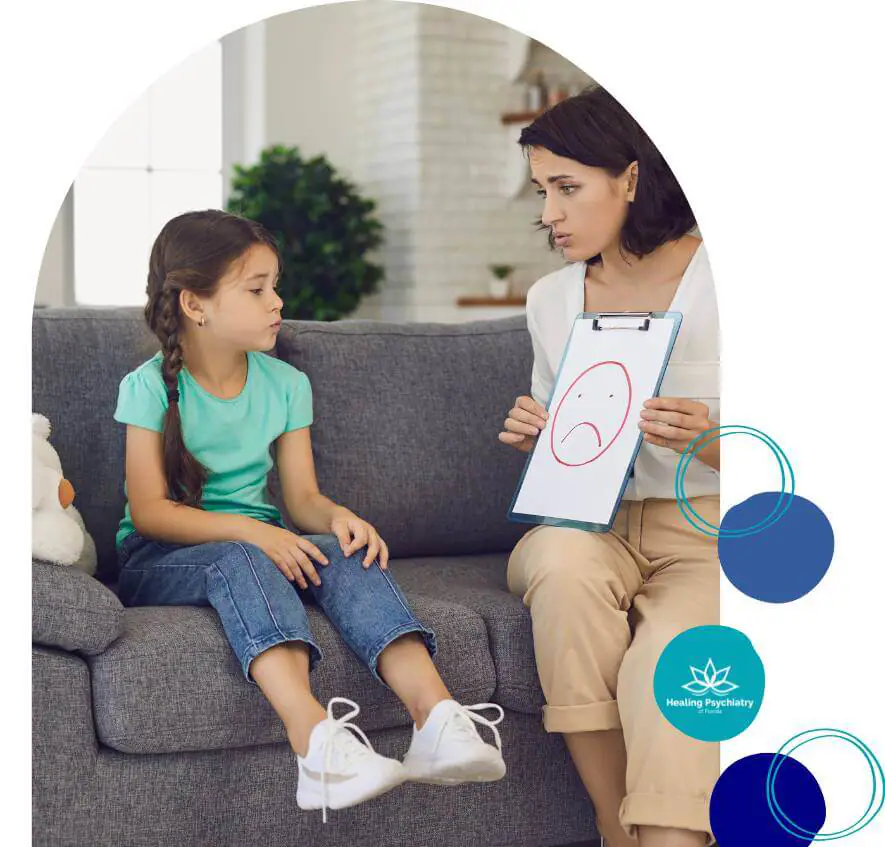Children’s Therapy for ADHD
Many parents don’t seek help until disruptions like lost homework, emotional outbursts, or endless reminders become too frequent. ADHD can show up as impulsiveness, daydreaming, or struggles with focus and emotional regulation—rather than defiance.
At Healing Psychiatry of Florida, we help children ages 4–12 develop tools to manage attention, reduce stress, and improve daily routines. Through behavioral therapy, parent training, and targeted strategies, we make ADHD more manageable and life a bit calmer for families.

Start Your Session Today
Our ADHD Therapy Path
ADHD doesn’t look the same in every child, and it’s not always about high energy. Some kids are constantly moving. Others zone out, lose track of instructions, or seem “lazy” when they’re actually overwhelmed. The core symptoms of attention deficit hyperactivity disorder (ADHD) show up in how a child pays attention, follows directions, manages frustration, and stays organized.
What looks like misbehavior is often something else: a child who’s trying to cope without the tools they need. Recognizing those patterns is the first step toward change.
Understanding the Neurological Roots
ADHD begins as a difference in how the brain regulates attention, impulse control, and executive function. These aren’t simply personality quirks—they’re rooted in how your child’s brain processes information and handles competing demands. Many children with ADHD are easily distracted, make careless mistakes, or struggle to stay focused even when they’re motivated to succeed.
Some may also have overlapping health conditions like autism spectrum disorder or anxiety, which can make symptoms harder to spot or treat. A comprehensive medical exam can help rule out other factors and guide a more accurate diagnosis plan for ADHD and moving forward.
ADHD at School—More Than a Behavior Issue
Most parents start noticing ADHD symptoms when school gets harder. Teachers report trouble finishing tasks, calling out, or “not trying hard enough.” At home, you might hear complaints about disruptive behavior or social conflicts with other children. Many kids with ADHD struggle with peer relationships, time management, and keeping up with classroom expectations.
For older children, this often leads to academic stress and falling behind. Some are eligible for an Individualized Education Plan (IEP)—but they still need therapeutic support to apply what they’re learning. We help your child build the skills to succeed in school, not just survive it.
Emotional Control and the ADHD Tipping Point
ADHD doesn’t just affect what your child does—it impacts how they feel. Meltdowns over small frustrations, bursts of anger, and deep shame after outbursts are common signs. These disruptive behaviors often leave parents feeling unsure of how to respond. Do you discipline effectively or comfort them? Do you stay calm—or snap back?
This is where behavior management and parent management training come in. When parents have the right tools to respond, it becomes easier to reinforce positive behavior. And when kids feel understood, not punished, they’re more likely to develop self-esteem and emotional control.
Insurances Accepted
See what others are saying about Healing Psychiatry of Florida
Meet Our Children’s Therapy Team
Our team understands the real-life challenges ADHD brings, from attention struggles to impulse control and frustration—whether it’s a busy Monday morning, school hallways, or late-night homework battles.
At Healing Psychiatry of Florida, each therapist is trained to recognize ADHD behaviors in children and break them down into manageable steps. We work directly with parents, schools, and other professionals, contributing to treatment plans, shaping Individualized Education Plans (IEPs), and collaborating with doctors when needed. We stay connected to what’s working and adjust as necessary, offering hands-on support every step of the way.




Behavior Therapy That Fits Real Life
Children with ADHD are often corrected more than they’re understood. They’re told to focus, sit still, or “try harder”—but that’s not what’s getting in the way. We use behavior therapy and targeted behavioral interventions to address the actual issues: task switching, impulse control, frustration tolerance, and inconsistent follow-through.
This includes building systems for positive behavior, reinforcing what works, and interrupting patterns that escalate. Every technique we use is linked to a real-life challenge—whether that’s finishing a worksheet, managing morning transitions, or handling feedback without shutting down.
Parent Training Isn’t Optional—It’s the Center of the Work
When ADHD disrupts a household, parents usually feel the impact long before the child gets a diagnosis. What’s often missing isn’t more discipline—it’s the right kind. We train caregivers in behavior management, teaching them how to respond clearly and consistently without relying on guesswork or emotion-driven decisions.
Parent management training is part of every ADHD care plan here. That includes strategies to reduce power struggles, handle refusals, and reinforce good behavior without making everything a negotiation. We teach methods that hold up through missed routines, overstimulation, and emotional volatility.


Our Approach to Treating ADHD in Children
We hear from parents every week who’ve tried praise, structure, screen limits, reward charts, and still feel like nothing is getting through. That’s because childhood ADHD isn’t solved by doing more of the same. It requires a treatment plan that actually matches how your child’s brain works.
At Healing Psychiatry of Florida, we focus on building practical tools for focus, follow-through, and emotional control. Therapy isn’t just talk—it’s hands-on, structured, and designed for how young children, older children, and their families function in real life.
Our Children’s ADHD Therapy FAQs
Can therapy help if my child’s behavior changes constantly from one day to the next?
Yes. Inconsistent behavior is common with ADHD and doesn’t mean therapy can’t help. We assess your child’s behavior over time and in different settings to understand patterns—not just isolated events. This gives us a better picture of what’s driving the disruptions and how to support more consistent responses.
Will my child need ADHD medications to see progress?
Not always. Many children improve significantly through therapy alone—especially when strategies are applied early and consistently. That said, for some children, ADHD medications may be recommended to help with focus and emotional regulation. If medication becomes part of the plan, we guide families through the process safely and collaboratively.
Do you work with specialists in adolescent psychiatry if my child’s needs change as they get older?
Yes. If symptoms persist into later childhood or adolescence, we may consult with or refer to professionals trained in adolescent psychiatry for more age-specific care. Continuity across developmental stages is key, and we plan for that as part of long-term support.
Where can I find reliable information about ADHD beyond just blogs and social media?
We recommend starting with trusted sources, such as the National Resource Center on ADHD, which offers evidence-based guidance for families. We’re also happy to help you find resources relevant to your child’s age, symptoms, and educational needs.
How can I tell if my child’s ADHD symptoms are more than just typical childhood behavior?
It often comes down to intensity, frequency, and how much those patterns disrupt daily life. If your child’s ADHD symptoms are interfering with learning, friendships, or routines at home, it’s worth seeking a professional assessment. The earlier you understand the scope, the more effectively you can support change.
Do you treat very young children with ADHD, or is therapy only for school-age kids?
We do work with very young children, including those as young as four, when ADHD symptoms are clear and persistent. Early intervention can prevent larger struggles later on by helping children build emotional regulation and social skills before habits become harder to shift.
Contact us
For more information about our systems and services, contact Healing Psychiatry of Florida.
Healing Psychiatry of Florida
108 W Citrus St, Altamonte Springs, FL 32714
help@healingpsychiatryflorida.com
Ps
Opening Hours
Monday – Thursday: 8AM – 7PM
Friday: 8AM – 5PM
Saturday: Closed
Sunday: Closed
ADHD Therapy Altamonte Springs, FL
